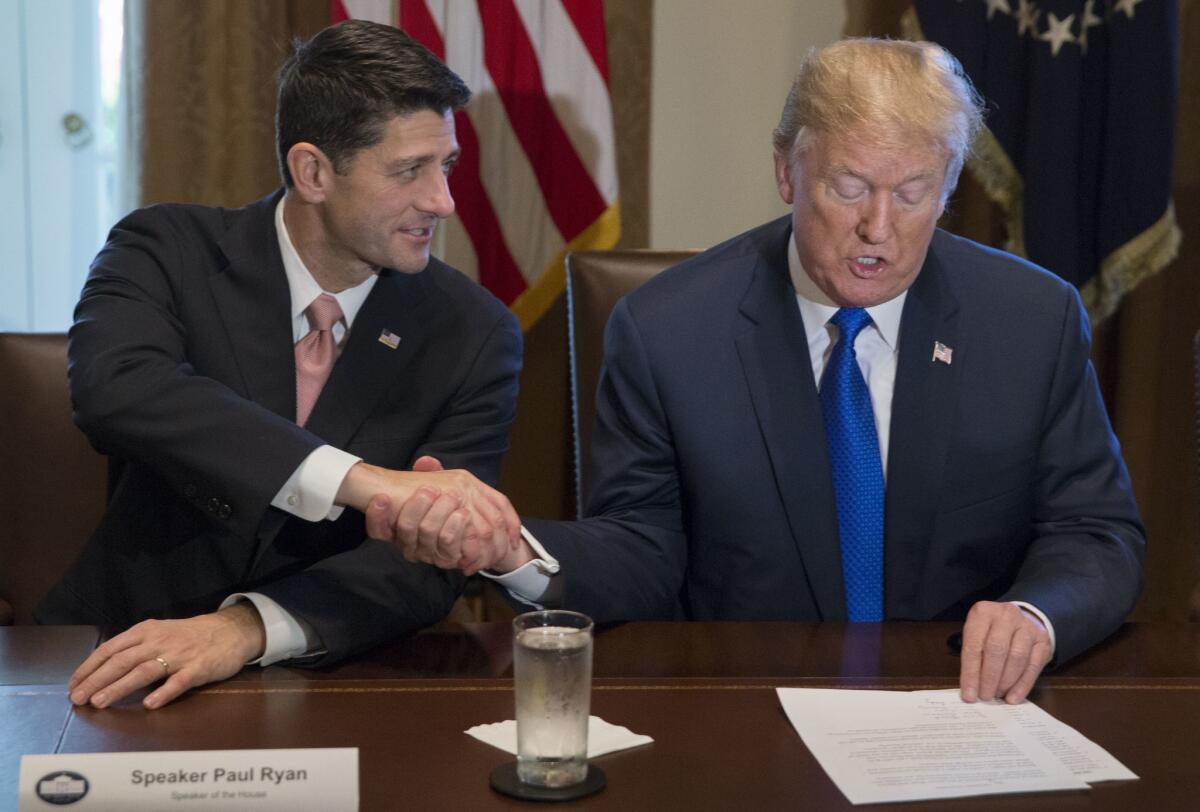House Republicans produced an ambitious tax overhaul, but now the hard work begins

Reporting from Washington — House Republicans produced an ambitious proposal to overhaul the tax code, but as lawmakers sift through the pages, sorting out winners and losers, any concerns they might have are being overpowered by the political momentum to deliver on one of President Trump’s top priorities.
The legislation is on a fast track to pass in the House in a matter of weeks, despite criticism that it’s heavily tilted toward corporations and the wealthy, does little for the middle class and will pile $1.5 trillion onto the deficit.
Instead, Republicans see in the Tax Cuts and Jobs Act an opportunity to salvage their legislative agenda, after limited accomplishments during Trump’s first year in the White House, and reshape the federal tax code to align with their low-tax, small-government goals.
“I’ve been around a lot of meetings over the years, and I have not been as encouraged as I am right now,” said Rep. Peter Roskam (R-Ill.), a member of the Ways and Means Committee that drafted the bill. He is appealing to voters back home to look at the entire package, rather than just the loss of mortgage interest and other popular deductions, and counseling colleagues to embrace debt rather than bemoan the red ink they railed against during then-Preisdent Obama’s term.
“You have a once-in-a-generation opportunity to do something that’s transformational, and we’re going to take advantage of it,” he said.
The legislation is the most sweeping overhaul of the tax code in 30 years, pushing down both corporate and some individual tax rates, while doing away with many itemized write-offs used by Americans to lower their tax bills in favor of a bigger lump-sum standard deduction.
It also enshrines conservative social priorities in the tax code — allowing college savings accounts for unborn children during pregnancy, limiting gambling deductions and repealing tax-free bond financing of sports stadiums.
But the centerpiece of the bill — and the priority for Republicans — is the new 20% corporate rate, down from 35%, which would be the lowest since 1939 and a windfall that, coupled with other business changes, would deprive the government of nearly $1 trillion in revenue.
Trump and his allies in Congress are counting on the lower tax rate to spur economic growth, arguing that the result will be higher paychecks as the benefits roll down to workers.
“In the words of Donald Trump, I think it’s going to be huge,” said Rep. Ted Yoho (R-Fla.), who said he was inclined to support the bill. “I experienced the ‘80s. ... I feel the ‘80s, the trickle down, worked pretty well.”
Many outside analysts, though, would have preferred a more gradual corporate rate reduction, and worry that middle-class households may not benefit as much.
“We are already running substantial deficits and the tax cuts would add significantly to fiscal shortfalls over the next decade,” wrote William Gale, co-director of the nonpartisan Tax Policy Center, in an analysis Friday.
Taxpayers would no longer be able to take many popular write-offs — for student loan interest, medical expenses or job-related costs such as the classroom supplies many teachers often buy. The $4,050 personal exemption would also be repealed and, most crucially for high-tax states like California, the bill eliminates the deduction for state and local income and sales taxes.
Instead, the standard deduction would almost double to $12,000 for individuals and $24,000 for couples. Those with children could claim a bigger child tax credit, which rises from $1,000 to $1,600. An additional $300 credit would be available for non-child-related family needs, like caring for an elderly parent. But, unlike the corporate tax cuts, which would be permanent, the family credit expires after five years.
The outcome may be a wash for many families, experts say. Republicans, in rolling out the plan, promised households would see average annual tax savings of $1,182 — a fraction of the benefit that is expected to flow to corporations and the wealthy.
“It’s really making suckers of the American people,” said House Minority Leader Nancy Pelosi (D-San Francisco). “They’re trying to pass this as a middle-class tax cut when they know it’s not.”
Undoubtedly the biggest fight ahead is over mortgage interest, which has brought an onslaught of criticism from the National Assn. of Relators and the National Assn. of Home Builders, and is causing the most discomfort for lawmakers from high-cost regions like New York, California and vacation communities.
The bill would cap the mortgage interest deduction to loans of no more than $500,000, rather than the current $1 million, and end the deduction entirely on second homes. Such provisions have been considered for years by both parties, but largely in broader debates about strategies for affordable housing or paying down debt — not to fund tax breaks.
Northeastern state lawmakers, who successfully fought earlier efforts to include repeal of the property tax deduction that is so important to residents in New York and New Jersey, are now turning their attention to mortgage interest.
New Jersey Rep. Tom MacArthur wants to raise the mortgage deduction beyond the bill’s $500,000 loan limit and retain it for second homes.
California’s Republicans have been less involved in those discussions as they largely stick with Majority Leader Kevin McCarthy (R-Bakersfield) and party leaders leaning toward supporting the bill.
Opposition, though, is mounting as outside groups begin to pressure lawmakers on a range of specific provisions that do not always fall along partisan lines.
For example, groups aligned with the conservative Koch brothers balked over a 10% surcharge on some overseas corporate operations, even though they backed off harsher initial criticism of the bill.
“We’re now in the opening ceremonies of the lobbyist Olympics,” said Roskam.
Trump appears to be playing a more substantive role than during the GOP’s failed effort earlier this year to repeal the Affordable Care Act.
Rep. Kevin Brady (R-Texas), the chairman of the Ways and Means Committee, said he has been in constant contact with the president, who was on the phone this week as Republicans made final tweaks to the bill before rolling it out.
”The whole purpose on this was to not do what we did in healthcare,” Brady said at a forum Friday sponsored by Politico.
House Republicans passed their Obamacare repeal bill earlier this year, only to see the president — after initially celebrating it — later deride it as “mean.” A revised measure, and others, later stalled in the Senate.
“The time spent with the president is really crucial to getting it to his desk,” Brady said.
“Because we’ve not delivered on our promise on healthcare repeal, it’s critical we deliver on our promise on tax reform,” he said. “We achieve this, or near to it, we have delivered on our promise, in a big way.”
ALSO
Conservatives lament retention of top tax rate in GOP plan, but the wealthy still reap big benefits
Is this small-town congressman from New Mexico tough enough to win Democrats the House majority?
More coverage of politics and the White House
More to Read
Get the L.A. Times Politics newsletter
Deeply reported insights into legislation, politics and policy from Sacramento, Washington and beyond. In your inbox three times per week.
You may occasionally receive promotional content from the Los Angeles Times.











